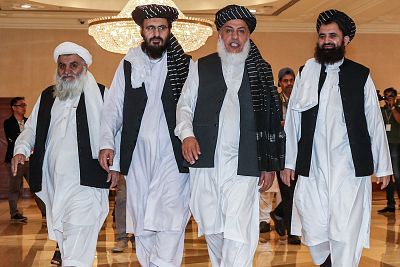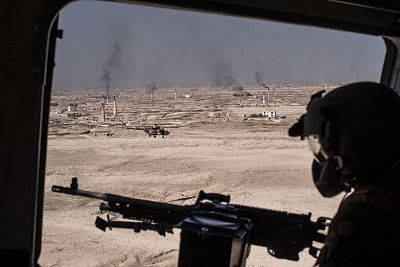A Western official told NBC News that Washington had "ambitious timelines" for the talks and was pushing to secure a deal by the end of December.
Talks between the United States and the Taliban resumed this weekend, three months after President Donald Trump abruptly cancelled the negotiations aimed at ending America's longest war.
News of the talks came just before The Washington Post reported it had obtained more than 2,000 pages of government documentsthat it says show how U.S. officials have for years misled the public about the war in Afghanistan.
On Monday, the Post reported that senior U.S. officials hid evidence that the war had become unwinnable. NBC News has not been able to independently verify the documents, which the paper obtained through a Freedom of Information Act request.
NBC News has contacted the White House, State Department and Pentagon for comment.
The U.S.-Taliban talks restarted in the Qatari capital, Doha, on Saturday with thegoal of reducing violence and laying the groundwork for peace talksbetween the Taliban and the Afghan government, a State Department spokesperson told NBC News.
A separate Western official with knowledge of the discussions told NBC News that the aim was to essentially "pick up where they left off."
The official said Washington had "ambitious timelines" for the talks and was pushing to secure a deal by the end of December and then have talks between the Afghan government and the Taliban begin promptly in January.
Trump called off negotiations on Sept. 7, ending a near yearlong effort to broker a deal with the militant group. Prior to negotiations being cancelled, the U.S. and the Taliban had reached an agreement "in principle"that hinged on a phased withdrawal of U.S. troops from the country, in exchange for the Taliban agreeing to enter peace talks with the Afghan government and pledging to renounce terrorist allies, including al Qaeda.
There are currently between 12,000 and 13,000 troops in Afghanistan, according to Defense Secretary Mark Esper. The U.S. has had boots on the ground since 2001, when American forces toppled the Taliban regime for harboring Osama bin Laden the architect behind the Sept. 11 attacks.
Since 2001, around 2,300 American service members have died there, according to the Department of Defense. Between Jan. 2009, when the United Nations began a systematic documentation of civilian casualties, and Sept. 2019, some 34,000 Afghan civilians died as a result of the armed conflict.
A Taliban leader in Qatar and two others in Afghanistan told NBC News the group was willing to agree a "complete cease-fire" with the U.S. during talks if Washington agrees to eventually withdraw all troops from Afghan territory.
However, they said the cease-fire would not include Afghan troops and maintained that they would not sit down with President Ashraf Ghani's government. The Taliban has persistently refused to negotiate with or recognize the Western-backed government in Kabul, referring to Ghani as an American puppet.
"We would continue our operations against the Afghan government even if we announced a cease-fire for the U.S.," said a Taliban commanderin Helmand Province, who spoke on the condition of anonymity because they were not permitted to speak to the media.
The Taliban currently control or hold sway in about half of the country.
Esper said Saturday that he wanted to reduce the number of U.S. troops in Afghanistan even if the Taliban deal does not come off. He did not give details on how many American troops may be withdrawn from the country.
But service members are already leaving Afghanistan. In October, the top U.S. general in Afghanistan said the total number of troops in the country had decreased by around 2,000.
NBC News reported in Augustthat Trump has made clear to his advisers that he wants to pull all U.S. troops out of Afghanistan by the 2020 election, according to five current and former administration and military officials.
Mushtaq Yusufzai reported from Peshawar, Abigail Williams and Dan De Luce from Washington and Saphora Smith from London.













